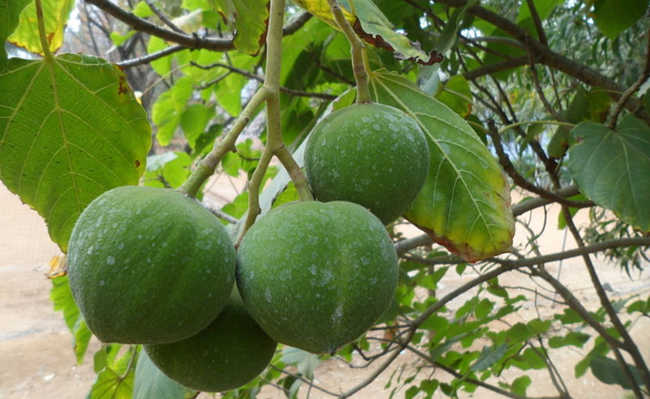Do you lose weight?
The consumption of horseradish to lose weight has significant side effects and can even be fatal.

Edited and resized image of B Saranya is available on Wikimedia
The Indian Nut, written in formal language as the Indian nut and scientifically known as Molucanus Aleuritis , it is a plant that belongs to the family Euphorbiaceae. It is not known for sure where the Indian nut is native, as human dissemination has spread its seeds all over the world, mainly in Indonesia, Malaysia and India. But it is also found in Argentina, Paraguay and southern Brazil.
When the nut ripens, it turns beige. In Brazil, it is believed that those who consume it lose weight. However, eating Indian nut can cause serious side effects, and even lead to death.
Indian nut has a high diuretic and laxative power. This is precisely why its use is believed to be suitable for slimming and it is also why it has been marketed as a weight loss product. But sales were not authorized by Anvisa (National Health Surveillance Agency) and the plant is extremely toxic. For this reason, Anvisa prohibited the sale, distribution or import of Noz da India in any region of Brazil.
Indian Nut Side Effects
Indian nut contains saponin and phorbol, which are two toxic substances when consumed raw and in large quantities. Among the side effects of these substances present in the Indian nut are:
- Abdominal pain
- vomiting
- Arrhythmia
- Breathing problems
- excessive flatulence
- Sweating
- Diarrhea
- Muscle pain
- Headache
- Dehydration
- Cramp
- malnutrition
- Death
Due to its laxative action, Indian nut can cause an excessive reduction of potassium and magnesium in the body. One of the possible consequences of this loss is the insufficiency in the functioning of the nervous system - and with this the heart and other muscles lose their regular functioning.
These side effects are even more intense in people with intestinal inflammation (colitis), irritable bowel syndrome (IBS), liver, heart, and kidney problems; and in pregnant women, the elderly, sick people, children and those allergic to the Indian nut.
The interaction of Indian nut with some medications can still cause side effects such as:
- Mydriasis (dilation of the pupil)
- Nausea
- psychomotor agitation
- behavioral disorders
- hallucinations
- Mucosal dryness
- gastric and digestive problems
- Dehydration
According to Anvisa, there is already evidence of Indian nut toxicity and the occurrence of three cases of death in Brazil associated with the consumption of the plant. Furthermore, a study carried out at the Federal University of Grande Dourados showed that Indian walnut seeds have the potential for cytotoxicity (ability to destroy cells through the release of harmful substances) and mutagenicity (ability to induce mutation in the body).
So, if you're thinking about consuming Indian nut to lose weight, think carefully if you want to put your life at risk. Remember that miracle diets can end up having the concertina effect: you lose weight quickly, but shortly thereafter, you gain all the weight again - or even more.
Regular exercise, maintenance of a balanced diet as a long-term habit, and regular sleep are the most effective ways to maintain health. If you need to lose weight, seek medical help and a nutritionist.
To know other tips on how to lose weight healthy, take a look at the article: "How to lose weight healthy".










